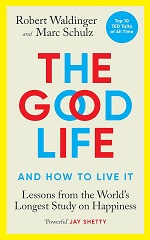
Philosophisch-ethische Rezensionen
(Erscheinungsdatum der rezensierten Bücher: 20. und 21. Jahrhundert)
- Aktuelle Rezension
- Rezensionen nach Autor
- Neueste Rezensionen
- Gästebuch
- Mail an Rezensenten
- Philosophenraten
Robert Waldinger, Marc Schulz, The good life and how to live it. Lessons from the World' s Longest Study on Happiness, Great Britain 2023
The authors are director and associate director of the Harvard Study of
Adult Development respectively. This stunning study has followed the lives of two generations of individuals from the same
families for more than eighty years from youth until death. It began 1938 and is still going on today. The radical new
question for its time of the study is not to ask what made people sick, but what made them thrive. Now the study includes
3 generations and more than 1.300 of the descendants of its original 724 participants. The conclusion of the book, its
evaluation is that when you want to make a single decision that could best ensure your own health and happiness, science
tells us that we should cultivate warm relationships of all kinds. And how to reach this the authors and The Harvard
Study of Adult Development want to point the way. Very touching stories of the study the book tells, stories of very
happy (and often seemingly inconspicuous) lives and stories of very unhappy (and often commercial successful) lives.
The findings of the studies are made by continuous questionnaires and also face to face interviews in longer intervals
and medical data. One of the happiest participants ever, the reader is told, was asked in a questionnaire at the end
of his life what his most enjoyable activity that he and his wife engage in together is. The Participant who serves
bravely in World War II, travelled all over the world, built his own homes with no formal training, who raised a happy
stepson and volunteered every day in his community, wrote the thing he and his wife enjoyed most was: "Just being together."
And therein basically lays the key for a happy life. Happy relationships with family, close and remote friends or even
an interested attitude in mere casual acquaintances. The authors know: The good life is a complicated life for everybody.
It is joyful and challenging. And it never strictly happens, but instead it unfolds through time. It is a process. And
of course, it always ends in death. The Harvard Study is in general prospective, the participants are asked about the
life as it is, not as it was. After studying hundreds of entire lives, the authors confirm that a life of good relationships
stands out for its power and consistency. People who are more connected to family, friends, community are happier and
physically healthier than people who are less connected. Lonely people also live a shorter life. Concerning this the
authors are alarmed that this sense of disconnection from others is growing across the world. But the study also shows:
It is never too late for striving for good connections and a good life. Good relations, they are convinced, keep us happier,
healthier and help us live longer. And this is true across the lifespan, across cultures and contexts. And therefore
almost certainly true for nearly every human being who ever lived. For this reason they argue that social fitness should
be taught to children and be a central consideration in public policy. The authors wrote the book to share that it doesn't
matter whether how old someone is, where he is in his life cycle, whether someone is married or not, introverted or
extroverted; but everyone can make positive turns in their lives. Thus they give plenty tips for every life cycle, partner
crisis, family matters and friendship, how to reach (be interested and curious!) and how to uphold good relationships.
An encouraging, positive book with only one theme: Good relationships. That also means many, many recurrences and negligence of other points that may be also important for a happy life. But easy to read, with some lengths, but helpful and an eye opener in many respects.

![]()